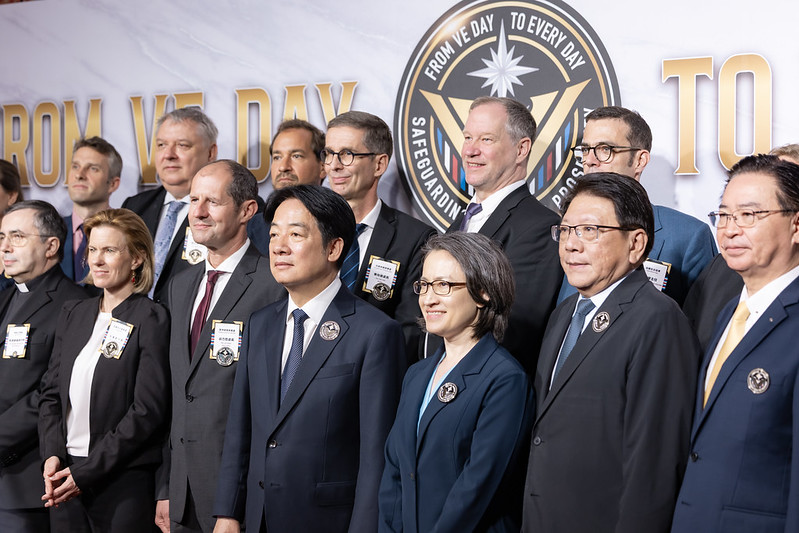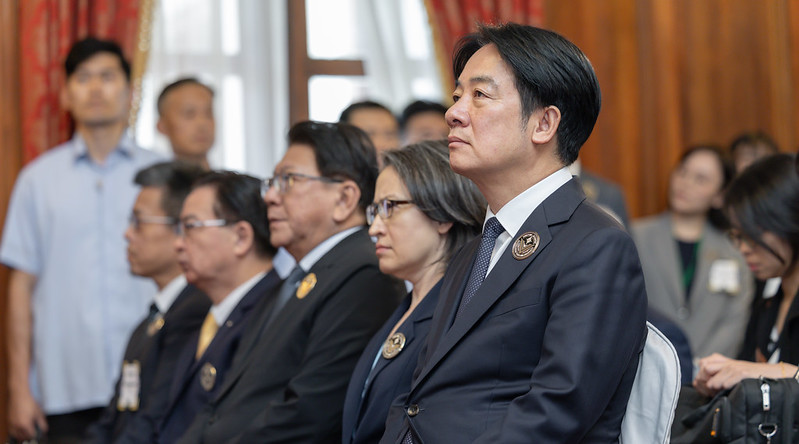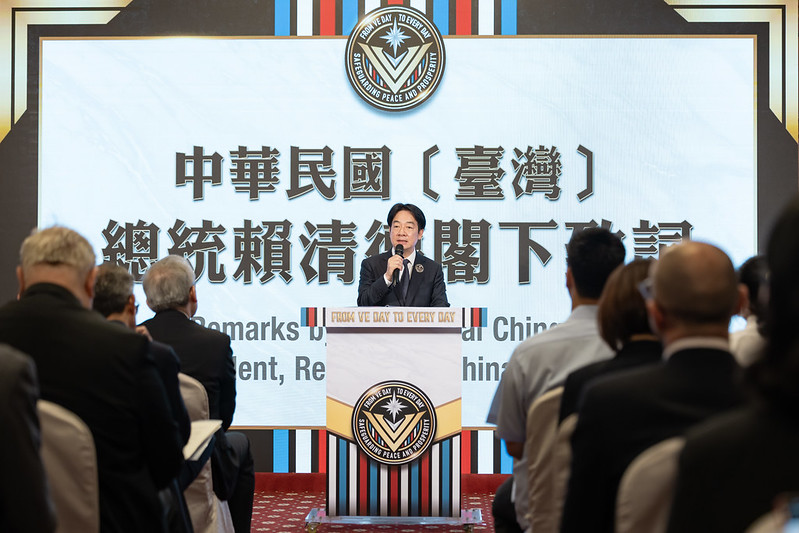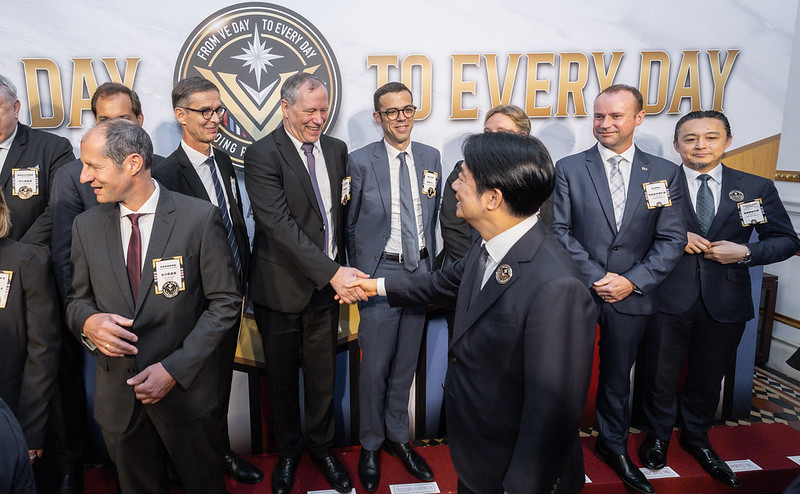News & activities
 News releases
News releases
On the morning of May 8, President Lai Ching-te, accompanied by Vice President Bi-khim Hsiao, attended a reception commemorating the 80th anniversary of Victory in Europe Day (VE Day). In remarks, President Lai stated that our commemoration of the Victory in Europe underscores three crucial points: The pursuit of true peace is dependent on determination and efforts to protect freedom and democracy, and must be achieved through strength and unity; only freedom and democracy can truly bring about national development, and only with respect for human dignity can a nation itself earn respect; and remembering the lessons learned from the history of the war, those who cherish peace must remain vigilant toward acts of aggression.
The president emphasized that as Taiwan and Europe are now facing the threat of a new authoritarian bloc, lovers of freedom around the world, both individuals and nations, must work together to make sure that aggressors have no opportunity to advance on their ambitions. He said he is confident that so long as we combine our efforts, our strength can earn us true and lasting peace; so long as we join together in solidarity, our freedom can illuminate the vast, boundless world; so long as we stand firm in our convictions, we absolutely can protect our way of life, the homelands that support us, and every lover of freedom and democracy.
A translation of President Lai’s remarks follows:
We are solemnly gathered here today, along with representatives from nations around the world, to mark VE Day – the anniversary of the end of World War II in Europe. This is the first time that Taiwan is commemorating the war in Europe, signifying our growing connections with the international community.
Peace is priceless, and war has no winners. WWII was undoubtedly the deadliest war in human history, and the pain that it caused has echoed even to the present day.
On this day 80 years ago, Nazi representatives surrendered to the Allies, symbolizing the end of WWII in Europe. The Allies then shifted their focus to the Pacific theater, where the war ended three months later.
Victory in Europe was the beginning of the end of this long road, and it was a point at which humanity could start to envision a world beyond the war.
Victory in Europe counted on different countries all combining their efforts. And today, this event has brought together representatives from a total of 17 countries in addition to the European Union, a testament to the value of cooperation.
Our commemoration of VE Day underscores three crucial points:
First, the foundation for victory in WWII was built from determination and actions throughout human society to unite and resist aggression, defend hearth and home, and pursue true peace.
History has taught us that no matter the driving reason or ideology, military aggression against another country is an unjust crime that is bound to fail. Those who unite as partners to defend their homelands, freedom, and democracy ultimately emerge victorious.
In less than one month from now, we will also be marking the 81st anniversary of the Normandy landings, when airborne divisions descended and beachheads were established by Allied troops fighting courageously across different landing sites.
Through the cooperation and efforts of the Allies, as well as the sacrifices of freedom fighters in occupied territories, Europe was liberated from authoritarian enslavement. From this, we learned that the pursuit of true peace is dependent on determination and efforts to protect freedom and democracy, and must be achieved through strength and unity.
Second, the countries that were formerly Axis powers are now all 100 percent democratic, enjoying true peace and prosperity and respected the world over.
This proves that only freedom and democracy can truly bring about national development, and only with respect for human dignity can a nation itself earn respect. Authoritarianism and aggression lead only to slaughter, tragedy, and greater inequality.
When we look back at post-war history, we see that civilizations with democratic elections, free markets, and respect for human rights are those that humanity should pursue. We also see the value of freedom and democracy, and the reason why tens of millions of Allied soldiers crossed oceans or set foot on unfamiliar lands to fight gruesome battles.
Now, I would like to share the words of former United States President Dwight D. Eisenhower, the Supreme Commander of the Allied Expeditionary Force in Europe during the war. In his order of the day for D-Day, he wrote: “Soldiers, Sailors and Airmen of the Allied Expeditionary Force! You are about to embark upon the Great Crusade, toward which we have striven these many months. The eyes of the world are upon you. The hope and prayers of liberty-loving people everywhere march with you.” These words tell us why we must commemorate the war in Europe; they also remind us again that freedom and democracy, being so precious, can only be resolutely defended through strength and constant vigilance.
Third, those who cherish peace cannot sit idly by and allow aggression. The outbreak of the war in Europe certainly had much to do with an authoritarian regime seeking to satisfy its expansionary ambitions, but its wider spread throughout Europe had much more to do with a lack of vigilance toward acts of aggression.
At many points in history, people have thought to give the aggressor a small concession to earn peace. But as we all know from the painful lessons of WWII, indulging aggressors with a taste of expansion only whets their appetite; it makes them more confident and hungrier for more. They will continue their conquest until democratic countries have fallen and the light of freedom has been extinguished; until the last person unwilling to bend is eliminated. Only then will the aggressors stop.
WWII broke out because ambitions for conquest were ignored; it was won by bringing together in solidarity every last bit of will to resist and defend hearth and home.
The war in Europe ended 80 years ago. The meaning of that history is now as clear as day. After those 80 years, Taiwan now shares the same values as many of the democratic countries that fought in the war, and we face similar challenges.
Taiwan and Europe are now facing the threat of a new authoritarian bloc. We are seeing our decades-old undersea cables, crucial for communications and cybersecurity, being sabotaged. We are seeing external interference in our elections, crucial for healthy democratic development, through the spread of misinformation and disinformation, sowing intentional division in society. We are seeing our fair, free, and open international rules-based markets being tested by all manner of gray-zone activities, intrusions, dumping, and pressures.
Whenever we commemorate the peace at the end of the war in Europe, we must not forget the lessons learned from its history.
Lovers of freedom around the world, both individuals and nations, must work together now in tight solidarity, before risks turn into crises and before crises are taken advantage of by those with ambitions for outward expansion, to make sure that aggressors have no opportunity to advance on their ambitions. Only then can we continue on for generations with our current way of life; only then can we retain our human dignity and values.
This is our opportunity; there is no better time than now. I am confident that so long as we combine our efforts, our strength can earn us true and lasting peace. I am confident that so long as we join together in solidarity, our freedom can illuminate the vast, boundless world. And I am confident that so long as we stand firm in our convictions, we absolutely can protect our way of life, the homelands that support us, and every lover of freedom and democracy.
And so, let us keep striving together, From VE Day to Every Day. Thank you.
Also in attendance at the event were Head of the European Economic and Trade Office Lutz Güllner, British Office Taipei Representative Ruth Bradley-Jones, and other diplomatic representatives in Taiwan.






